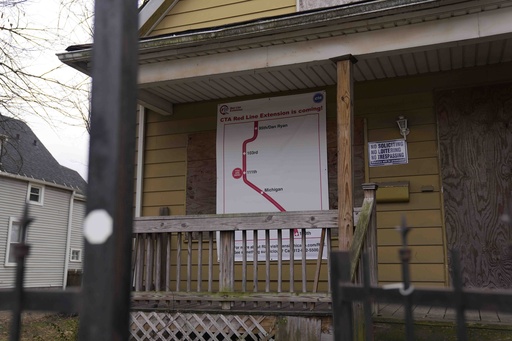CHICAGO — Adella Bass faced significant challenges attending her college classes due to the limited public transportation options from her home in the far South Side of Chicago, where the well-known elevated train does not operate. A journey to the hospital for her heart condition can take her almost two hours. However, there is hope on the horizon as bright red signs across her neighborhood exclaim, “Ready, Set, Soon!” Plans are underway for the city to fulfill a long-standing commitment to enhance mass transit accessibility for some of its most marginalized, neglected, and polluted communities.
Last week, the Biden administration informed Congress of its plans to allocate $1.9 billion towards a significant $5.7 billion project aimed at introducing four new L stations in the South Side—a venture that marks the largest expansion of the Chicago transit system in its history. This commitment, which is expected to be officially signed by the Federal Transit Administration before President Biden’s term concludes in January, secures both current and future funding for the essential project.
Despite this progress, Bass remains apprehensive about possible interruptions the incoming administration might pose. “There are numerous signs that the project is moving forward,” Bass stated, a community advocate and mother of three, “but you can’t predict what might happen under Trump’s administration.”
Concerns linger about potential budget cuts to transit funding. The infrastructure plan signed into law by Biden in 2021 placed far more emphasis on public transportation compared to proposals from the previous administration. This urgency has led to rapid finalizations of transit grants, including those for infrastructural upgrades in San Antonio and Salt Lake City, before the President’s term draws to a close.
Yonah Freemark from the Urban Institute noted that Trump had previously sought to remove funding for new transit projects that had not secured grant agreements in Congress. While it is unusual for an administration to retract funding from projects after they have received final approval, Steve Davis from Smart Growth America mentioned the possibility that the Trump administration might channel future competitive grants away from transit projects to prioritize highway construction instead. Although there may be attempts to slow down allocation timelines for approved projects, halting them entirely would likely be challenging.
With the new L station in Chicago set to serve neighborhoods such as Roseland—which has historically been a robust business area largely supported by the manufacturing sector but has seen a decline in recent years—there are high hopes for revitalization. Jervon Hicks, once entangled in gun violence and now a mentor for at-risk youth, believes that the construction of the new station could provide valuable opportunities for others. He stated, “Roseland needs a makeover… We need more local business options.”
The local business scene on South Michigan Avenue has suffered drastically, plummeting from over 90% occupancy several decades ago to around 10% today. Among the few surviving businesses is Edwards Fashions, whose owner Ledall Edwards is optimistic that improved transit access will attract more customers. “While it may not return to the levels seen in the 1970s, I’m hopeful for a better environment due to increased accessibility,” he explained.
Rogers Jones, who has managed the Youth Peace Center adjacent to the forthcoming train station for three decades, expressed enthusiasm about the impending changes. “The community is poised for transformation,” he remarked. “I know I’m excited and the people around me share that excitement.”
The journey towards this transit expansion began with a promise made by former Chicago Mayor Richard J. Daley in 1969, when he assured residents that the L train would eventually expand into Roseland. According to Tammy Chase from the Chicago Transit Authority, the estimated construction cost at that time was $114 million—an irony compared to the current projected expense of around $5.7 billion, which is expected to rise if the project faces further delays. With proactive steps already taken, including the hiring of a construction firm and setting up an office in Roseland, ground is anticipated to break in late 2025.
Congressman Mike Quigley, who oversees transportation spending, emphasized the resilience of Chicago’s transit system, highlighting its survival through historical crises like wars and economic downturns. He expressed confidence that the essential infrastructure projects will endure through political changes. “These significant undertakings have lasting importance,” Quigley affirmed. “While there are fluctuations, ultimately transit will always rebound. If it doesn’t succeed, opportunities for growth will be hindered.”


